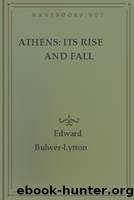Athens: Its Rise and Fall by Edward Bulwer-Lytton

Author:Edward Bulwer-Lytton
Language: eng
Format: epub
Publisher: ManyBooks.net
* * *
CHAPTER III.
Aristides.--His Character and Position.--The Rise of Themistocles.-- Aristides is Ostracised.--The Ostracism examined.--The Influence of Themistocles increases.--The Silver-mines of Laurion.--Their Product applied by Themistocles to the Increase of the Navy.--New Direction given to the National Character.
I. While the progress of the drama and the genius of Aeschylus contributed to the rising renown of Athens, there appeared on the surface of her external affairs two rival and principal actors, of talents and designs so opposite, that it soon became evident that the triumph of one could be only in the defeat of the other. Before the battle of Marathon, Aristides had attained a very considerable influence in Athens. His birth was noble--his connexions wealthy--his own fortune moderate. He had been an early follower and admirer of Clisthenes, the establisher of popular institutions in Athens after the expulsion of the Pisistratidae, but he shared the predilection of many popular chieftains, and while opposing the encroachments of a tyranny, supported the power of an aristocracy. The system of Lycurgus was agreeable to his stern and inflexible temper. His integrity was republican--his loftiness of spirit was patrician. He had all the purity, the disinterestedness, and the fervour of a patriot--he had none of the suppleness or the passion of a demagogue; on the contrary, he seems to have felt much of that high-spirited disdain of managing a people which is common to great minds conscious that they are serving a people. His manners were austere, and he rather advised than persuaded men to his purposes. He pursued no tortuous policy, but marched direct to his object, fronting, and not undermining, the obstacles in his path. His reputation for truth and uprightness was proverbial, and when some lines in Aeschylus were recited on the stage, implying that "to be, and not to seem, his wisdom was," the eyes of the spectators were fixed at once upon Aristides. His sternness was only for principles--he had no harshness for men. Priding himself on impartiality between friends and foes, he pleaded for the very person whom the laws obliged him to prosecute; and when once, in his capacity of arbiter between two private persons, one of the parties said that his opponent had committed many injuries against Aristides, he rebuked him nobly: "Tell me not," he said, "of injuries against myself, but against thee. It is thy cause I am adjudging, and not my own." It may be presumed, that with these singular and exalted virtues, he did not seek to prevent the wounds they inflicted upon the self-love of others, and that the qualities of a superior mind were displayed with the bearing of a haughty spirit. He became the champion of the aristocratic party, and before the battle of Marathon he held the office of public treasurer. In this capacity Plutarch asserts that he was subjected to an accusation by Themistocles, and even intimates that Themistocles himself had been his predecessor in that honourable office [31]. But the youth of Themistocles contradicts this statement;
Download
This site does not store any files on its server. We only index and link to content provided by other sites. Please contact the content providers to delete copyright contents if any and email us, we'll remove relevant links or contents immediately.
| Africa | Americas |
| Arctic & Antarctica | Asia |
| Australia & Oceania | Europe |
| Middle East | Russia |
| United States | World |
| Ancient Civilizations | Military |
| Historical Study & Educational Resources |
Magic and Divination in Early Islam by Emilie Savage-Smith;(1533)
Papillon by Henry Charrière(1432)
Bohemians, Bootleggers, Flappers, and Swells: The Best of Early Vanity Fair by Bohemians Bootleggers Flappers & Swells- The Best of Early Vanity Fair (epub)(1409)
Ambition and Desire: The Dangerous Life of Josephine Bonaparte by Kate Williams(1389)
Twelve Caesars by Mary Beard(1315)
What Really Happened: The Death of Hitler by Robert J. Hutchinson(1163)
Operation Vengeance: The Astonishing Aerial Ambush That Changed World War II by Dan Hampton(1162)
London in the Twentieth Century by Jerry White(1147)
The Japanese by Christopher Harding(1133)
Time of the Magicians by Wolfram Eilenberger(1126)
Twilight of the Gods by Ian W. Toll(1120)
Lenin: A Biography by Robert Service(1076)
The Devil You Know by Charles M. Blow(1025)
A Social History of the Media by Peter Burke & Peter Burke(976)
Freemasons for Dummies by Hodapp Christopher;(965)
Napolean Hill Collection by Napoleon Hill(943)
Henry III by David Carpenter;(919)
The Rise and Triumph of the Modern Self by Unknown(913)
Richard III (The English Monarchs Series) by Charles Ross(908)
